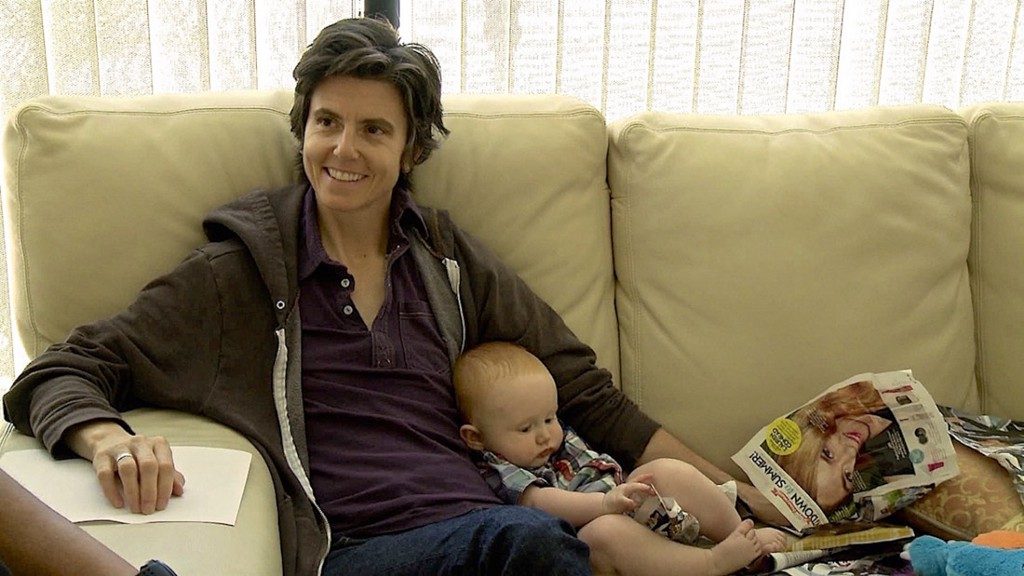Kristina Goolsby’s producing credits include Intervention and Who Do You Think You Are? Ashley York previously served as a producer on Inside Deep Throat and TransGeneration, and she directed the upcoming doc So Help You God.
Tig will premiere at the 2015 Sundance Film Festival on January 26.
W&H: Please give us a description of the film playing.
KG&AY: This documentary explores LA-based comedian Tig Notaro’s journey as her life unfolds in grand and unexpected ways, all while she is battling a life-threatening illness and falling in love. During a four-month period in 2012, Tig experienced a catastrophic series of personal events. She was diagnosed with bi-lateral stage II breast cancer and just a day after her diagnosis, Tig was inspired to deliver a legendary performance at the Largo Theatre in Los Angeles and opened by saying, “Good evening, hello, I have cancer.”
Not knowing if this would be the last performance of her life, she spent a half-hour talking about this news and the series of personal tragedies that preceded it: pneumonia, followed by a serious intestinal disease, followed by the unexpected death of her mother. The set became legendary over night.
The film is a hybrid of comedy and drama that captures a personal journey about facing crisis head on with honesty and grace, and overcoming pain and suffering with the healing power of comedy. It’s a story about moving forward during a period of your life when you don’t know what is going to happen, when you are willing to risk it all for what you believe is the right thing to do and for what you want to happen in this life.
W&H: What drew you to this story?
KG&AY: We had an incredible opportunity to be with someone at the precipice of great change. Here was someone who had just gone through some of the most devastating events that can happen in a life, in an incredible short period of time — only four months. How does one navigate through such a devastating period, and at the same time take on new challenges? What happens when your dreams come true at a time of devastating loss?
From our first conversation with Tig about the possibility of doing a documentary with her, we knew something very special was about to happen. And we were right!
W&H: What was the biggest challenge in making the film?
KG&AY: Keeping up with Tig and knowing when to stop filming. Tig lives an incredibly rich and varied life, and we were completely enamored by both her professional and personal life. We wanted to spend as much time documenting her journey as possible.
We had our first production meeting with her on a Saturday in early 2013 to talk about the possibility of making a documentary and we decided to dive right in and begin shooting tow days later at a photoshoot she had schedule with Elle Magazine. From that point forward, we were shooting multiple days a week with Tig as she bounced all around Los Angeles working on various productions and developing new stand up material.
W&H: What do you want people to think about when they are leaving the theatre?
KG&AY: Tig represents everything that is tragic and wonderful about the human experience and condition. We hope our film inspires people to confront challenges in new and interesting ways, and to find and honor the truth even in the most impossible and difficult times.
W&H: What advice do you have for other female directors?
KG&AY: Stay strong. Stick with it. Believe in yourself. You have more power than you can imagine. Your voice is vital and confidence is key.
W&H: What’s the biggest misconception about you and your work?
KG&AY: That a documentary can’t be funny.
W&H: How did you get your film funded? Share some insights into how you got the film made.
KG&AY: While we considered crowdfunding, we didn’t need to because we were in the fortunate position of meeting with a number of financiers and producers early on in the development who were as intrigued by Tig’s story as we were. We ultimately formalized a deal with Beachside Films, an independent film production company and the west coast affiliate of Big Beach Films (Little Miss Sunshine, Safety Not Guaranteed), who came on as financier and producing partner.
We were so grateful grateful to team up with an incredibly talented, capable, smart group of producers to work alongside to execute our vision. Along the way, we also talked with so many fellow filmmakers (among them Kirby Dick, Rachel Grady, Sally Rubin) who graciously offered their guidance and expertise to us as we navigated the process of financing our very first feature documentary.
We were also fortunate and so grateful to receive a Catapult Film Fund grant early on in our development. This grant provides development funding to documentary filmmakers who have a compelling story to tell, have secured access to their story, and are ready to shoot and edit a piece for production fundraising purposes. This fund was vital to us because it allowed us to develop our reel and treatment to a point where we could talk seriously with financiers.
W&H: Name your favorite woman-directed film and why?
KG&AY: Barbara Kopple’s Harlan County USA(1976). Aside from the fact we are both from the South and born and raised in Kentucky — where this Academy Award winning film was made — we are moved by this stunning and powerful story about this incredible place and time for so many reasons. The film tells the story of a coal miners’ strike in Southeast Kentucky and portrays its subjects with complexity, dignity, and grace. The film is as journalistic as it is cinematic. It’s personal, political, and emotional — a film that demonstrates social issue filmmaking at its finest.






